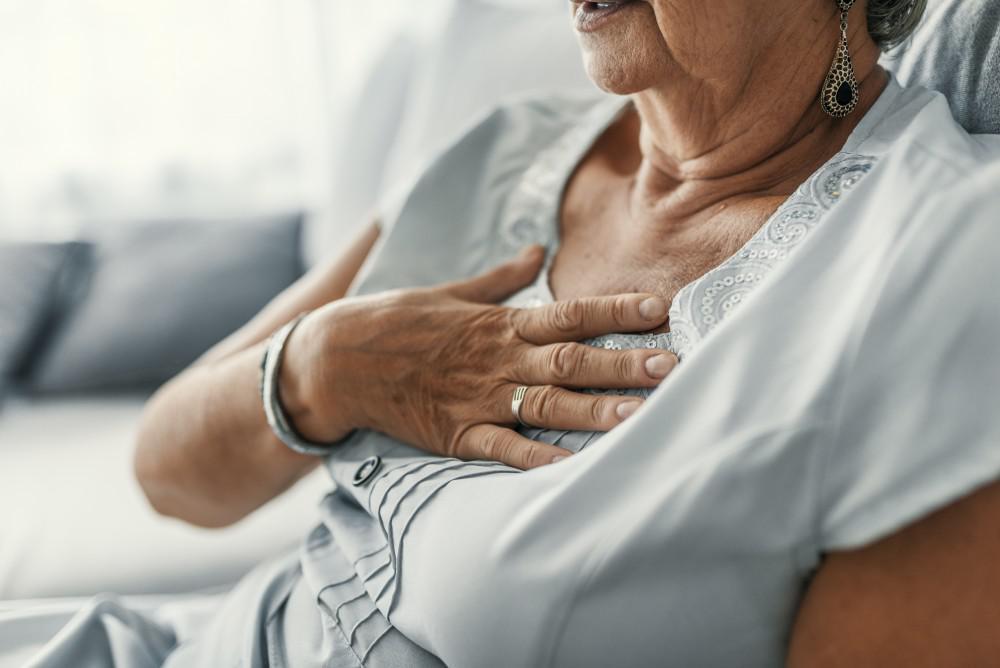Why Do You Feel Bubbles In Chest When You Lay Down?
Understanding why these sensations occur is crucial for recognizing potential health issues and seeking appropriate medical advice. This article explores the common reasons behind why do you feel bubbles in chest when you lay down, providing insights into the possible causes and necessary steps for evaluation and management.
Author:Suleman ShahReviewer:Han JuAug 04, 2024630 Shares63K Views

Feeling bubbles in the chest when you lay down can be an unsettling experience for many individuals. This sensation, often described as a bubbling or gurgling feeling within the chest cavity, may stem from various underlying causes involving respiratory, gastrointestinal, cardiovascular, musculoskeletal, or even psychological factors.
Understanding why these sensations occur is crucial for recognizing potential healthissues and seeking appropriate medical advice. This article explores the common reasons behind why do you feel bubbles in chest when you lay down, providing insights into the possible causes and necessary steps for evaluation and management.
Respiratory Causes
When you lie down and feel like you have bubbles in your chest, there's a good chance that the reason for them is respiratory. These problems mostly impact the lungs and airways, resulting in a range of pains and feelings. The following are a few typical reasons for respiratory symptoms:
Excess Mucus Production
The over production of mucus in the respiratory tract is one of the main causes of feeling bubbles in your chest. Allergies, infections, or environmental irritants can all cause this. Mucus may build up or shift in your airways when you're lying down, giving your breathing a bubbling feeling. This symptom might be made worse by illnesses like sinus infections or chronic bronchitis.
Bronchitis Or Respiratory Infections
The airways can become inflamed due to respiratory illnesses such pneumonia or acute bronchitis. The enlargement of the airways and increased mucus production caused by this inflammationcan make you feel like your chest is bubbling or gurgling when you breathe. Coughing is frequently a side effect of many illnesses, which can make the pain worse.
Asthma Or Allergies
Asthmais a chronic condition characterized by inflammation and narrowing of the airways. During an asthma attack or when exposed to allergens, the airways can become constricted, making it difficult to breathe properly. Allergies can also trigger similar symptoms by causing inflammation and mucus production in the respiratory tract. These conditions can cause wheezing, coughing, and a sensation of bubbles or tightness in the chest, particularly when lying down.
Gastrointestinal Causes
Acid Reflux (Gastroesophageal Reflux Disease)
When the stomach's acidic contents travel backward into the esophagus, acid reflux develops. Gastric reflux, often referred to as reflux backflow, can aggravate the lining of the esophagus and cause symptoms like heartburn or a burning feeling in the chest.
After eating, gravity helps less to keep stomach acid in place when you're lying down, which increases the likelihood of reflux. Occasionally, the movement of gas or acid in the chest can cause you to experience a bubbling or gurgling feeling in addition to the burning.
Gas Buildup
Gas can build up in the digestive tract for a variety of reasons, including swallowing air while eating or drinking, consuming gas-producing foods (such as beans or carbonated beverages), and digestive disorders like irritable bowel syndrome (IBS). Gas accumulation in the intestines or stomach can cause discomfort and pressure. This can feel like bubbles or even like there are acute aches in the chest, especially when you're lying down.
Hiatal Hernia
When a piece of the stomach pushes up through the diaphragm and into the chest cavity, it is called a hiatal hernia. This illness may make it easier for acid to reflux into the esophagus by weakening the barrier that separates the stomach and esophagus.
Heartburn, vomiting of food or drink, and a bubbly or bubbling sensation in the chest are all signs of hiatal hernias. Because lying down and bending over can put more strain on the stomach and aggravate reflux, these positions may make the symptoms worse.
Musculoskeletal Causes
Musculoskeletal causes for feeling bubbles in your chest when lying down often involve issues with the muscles, ribs, or joints in the chest area. These can include:
Muscle Strain
A bubbling sensation or discomfort can result from straining or overexerting the muscles in the chest wall, as happens when lifting large objects or engaging in vigorous physical activity. Because of the pressure on the afflicted muscles and the changes in posture, this sensation could get worse when you lie down.
Rib Injuries
Chest pain and discomfort can result from rib injuries such as fractures or bruising from trauma or accidents. The pressure on the injured ribs when lying down may make the cracking or bubbling sensation worse.
Costochondritis
Inflammation of the cartilage that joins the ribs to the breastbone (sternum) is known as Costochondritis. Chest pain, tenderness, and a popping or bubbling sensation in the chest region are possible side effects. This soreness could be more apparent when you're lying down or when you perform specific chest wall-affecting exercises.
Psychological Causes
Anxiety And Panic Attacks
It's essential to keep in mind that not all symptoms in the chest are brought on by medical ailments. A sensation of bubbles in the chest is one of the physical signs of anxietyand panic attacks. Breathlessness, tightness in the chest, and soreness in the chest are just a few of the sensations that can arise from the body's reaction to stress and anxiety. It's critical to get help from a mental healthexpert if you think anxiety is causing your symptoms.
Chronic Stress
Chronic stress can manifest physically in the chest area, affecting breathing patterns and muscle tension. When stress hormones like cortisol and adrenaline are elevated due to ongoing stress, they can lead to irregular breathing, including shallow or rapid breaths, which may create sensations like bubbles or tightness in the chest, especially when lying down and trying to relax.
Additionally, stress-induced muscle tension can cause discomfort or aching sensations in the chest muscles. Heightened sensitivity to bodily sensations during periods of stress can also contribute to noticing these feelings more acutely.
When To Seek Medical Help
Although most cases of feeling bubbles in the chest are harmless and resolves on their own, it is important to be aware of when medical attention is necessary. You should consider seeking medical help if you experience any of the following:
- Severe chest pain or pressure
- Difficulty breathing
- Irregular heartbeat
- Lightheadedness or fainting
- Excessive sweating
- Chest pain radiating to the arm, jaw, or neck
If you have concerns about your symptoms or they persist despite trying self-care measures, it is always best to consult with a healthcare professional to determine the underlying cause and receive appropriate treatment.
Treatment Options
Depending on the underlying reason, there are different treatment options for chest sensations like bubbles. Treatments for respiratory conditions including infections or excessive mucus may involve thinned mucus-thinning medicines and steam therapyto release mucus. In addition to taking medication to lower stomach acid, lifestyle modifications including avoiding trigger foods and eating smaller meals can help manage digestive disorders like acid reflux.
Muscle strains and rib injuries are examples of musculoskeletal conditions that may need rest, painkillers, and occasionally physical treatment to strengthen the affected muscles. Counseling, mindfulness, and deep breathing exercises are examples of relaxation strategies that can help with psychological issues like stress or anxiety. For an accurate diagnosis and customized treatment recommendations based on unique symptoms and medical history, it's crucial to speak with a healthcare professional.
Preventive Measures
- Maintain A Healthy Lifestyle:Adopting a balanced diet rich in fruits, vegetables, and whole grains, and avoiding trigger foods like spicy or fatty foods can help prevent gastrointestinal issues such as acid reflux that contribute to chest discomfort.
- Manage Stress:Incorporate stress-reduction techniques such as deep breathing exercises, yoga, meditation, or hobbies into your daily routine to mitigate the physical effects of stress on the body, including chest sensations.
- Practice Good Posture:Maintaining proper posture throughout the day can help alleviate musculoskeletal strain on the chest muscles and ribs, reducing the likelihood of discomfort or sensations when lying down.
- Stay Active:Engage in regular physical activity to strengthen muscles, improve overall health, and reduce stress levels, which can indirectly benefit chest discomfort associated with various causes.
- Avoid Smoking And Alcohol:Both smoking and excessive alcohol consumption can exacerbate respiratory and gastrointestinal issues, contributing to chest discomfort. Quitting smoking and moderating alcohol intake can improve overall chest health.
- Monitor Medication Use:If you have a condition requiring medication, ensure you take it as prescribed and discuss any potential side effects with your healthcare provider to minimize their impact on chest sensations.
- Maintain A Healthy Weight:Being overweight can increase pressure on the abdomen and chest, exacerbating symptoms of acid reflux and other gastrointestinal issues. Aim for a healthy weight through diet and exercise.
Why Do You Feel Bubbles In Chest When You Lay Down? - FAQs
How To Get Rid Of Air Bubbles In Chest?
Lie on your stomach, then curl your knees in toward your chest, stretching your arms forward as far as they will go, and then arch your back. Repeat while keeping your head level with your throat. Lie down and quickly get up, repeating as necessary.
Will A Chest Infection Go Away On Its Own?
A chest infection will either be caused by: a virus (like viral bronchitis) – this usually clears up by itself after a few weeks and antibiotics will not help. bacteria (like pneumonia) – a GP may prescribe antibiotics (make sure you complete the whole course as advised by the GP, even if you start to feel better).
What Are Three Symptoms Of Bronchitis?
The most common symptoms of bronchitis are:
- Runny, stuffy nose.
- Low-grade fever.
- Chest congestion.
- Wheezing or a whistling sound while breathing.
- A cough that may produce yellow or green mucus (sputum)
- Feeling run-down or tired.
Wrap Up
Experiencing a bubble-like feeling in the chest when you lay down can be uncomfortable and concerning. While it may have various causes, ranging from harmless to more severe, it is important to pay attention to your symptoms and seek medical evaluation if necessary. Whether it requires lifestyle modifications, stress management techniques, or medical intervention, addressing the root cause is crucial for finding relief and ensuring overall well-being.

Suleman Shah
Author
Suleman Shah is a researcher and freelance writer. As a researcher, he has worked with MNS University of Agriculture, Multan (Pakistan) and Texas A & M University (USA). He regularly writes science articles and blogs for science news website immersse.com and open access publishers OA Publishing London and Scientific Times. He loves to keep himself updated on scientific developments and convert these developments into everyday language to update the readers about the developments in the scientific era. His primary research focus is Plant sciences, and he contributed to this field by publishing his research in scientific journals and presenting his work at many Conferences.
Shah graduated from the University of Agriculture Faisalabad (Pakistan) and started his professional carrier with Jaffer Agro Services and later with the Agriculture Department of the Government of Pakistan. His research interest compelled and attracted him to proceed with his carrier in Plant sciences research. So, he started his Ph.D. in Soil Science at MNS University of Agriculture Multan (Pakistan). Later, he started working as a visiting scholar with Texas A&M University (USA).
Shah’s experience with big Open Excess publishers like Springers, Frontiers, MDPI, etc., testified to his belief in Open Access as a barrier-removing mechanism between researchers and the readers of their research. Shah believes that Open Access is revolutionizing the publication process and benefitting research in all fields.

Han Ju
Reviewer
Hello! I'm Han Ju, the heart behind World Wide Journals. My life is a unique tapestry woven from the threads of news, spirituality, and science, enriched by melodies from my guitar. Raised amidst tales of the ancient and the arcane, I developed a keen eye for the stories that truly matter. Through my work, I seek to bridge the seen with the unseen, marrying the rigor of science with the depth of spirituality.
Each article at World Wide Journals is a piece of this ongoing quest, blending analysis with personal reflection. Whether exploring quantum frontiers or strumming chords under the stars, my aim is to inspire and provoke thought, inviting you into a world where every discovery is a note in the grand symphony of existence.
Welcome aboard this journey of insight and exploration, where curiosity leads and music guides.
Latest Articles
Popular Articles

